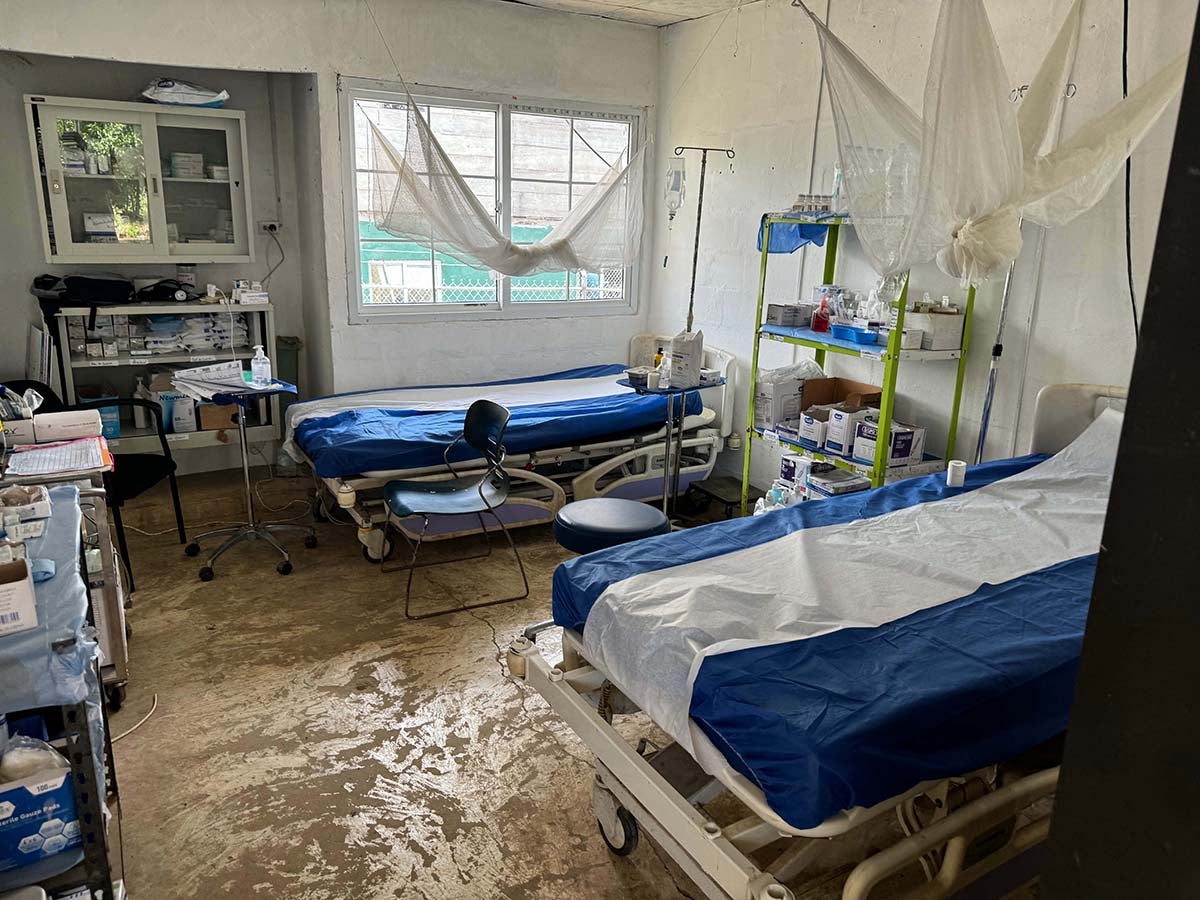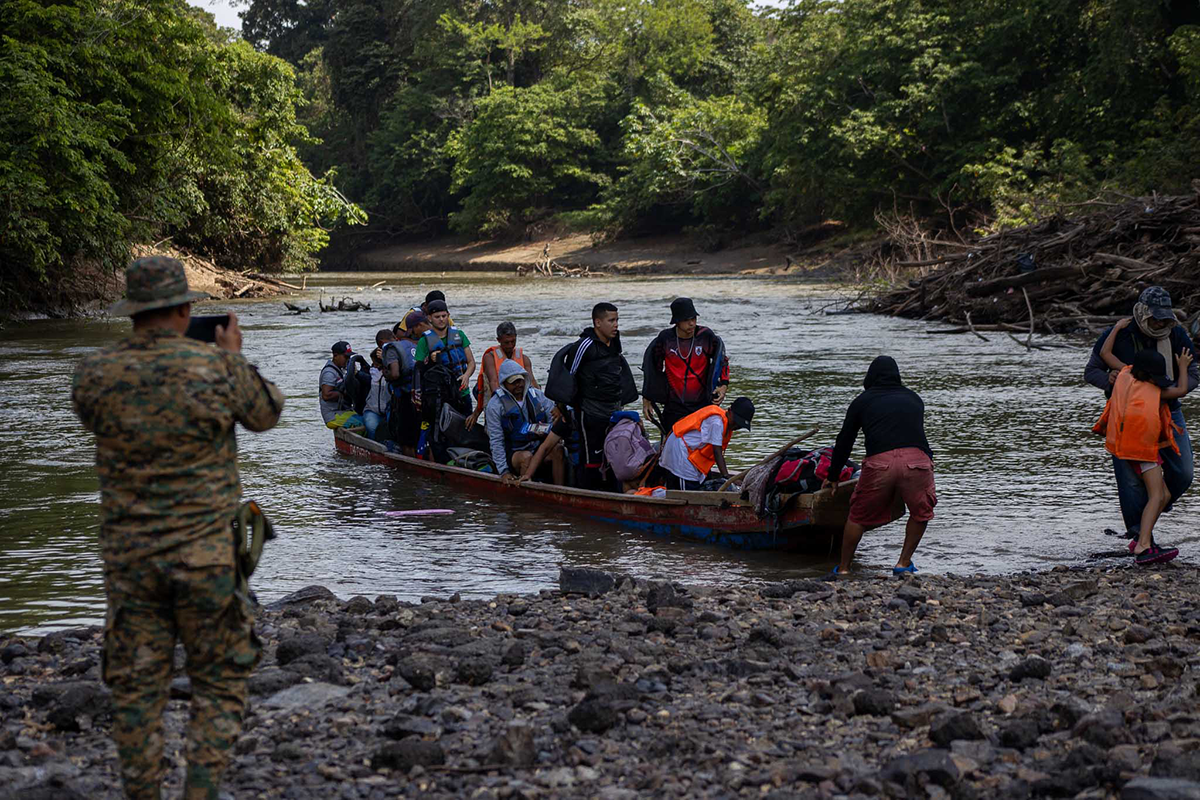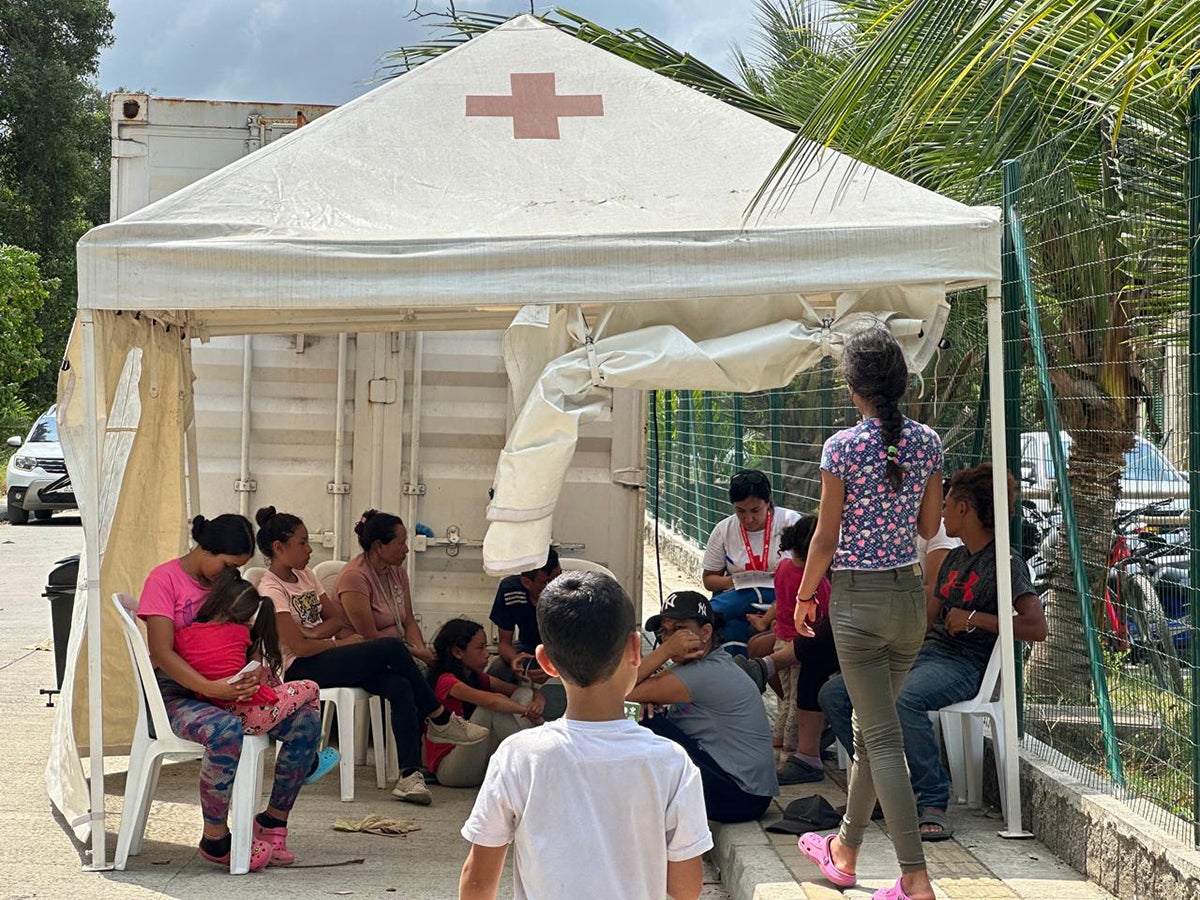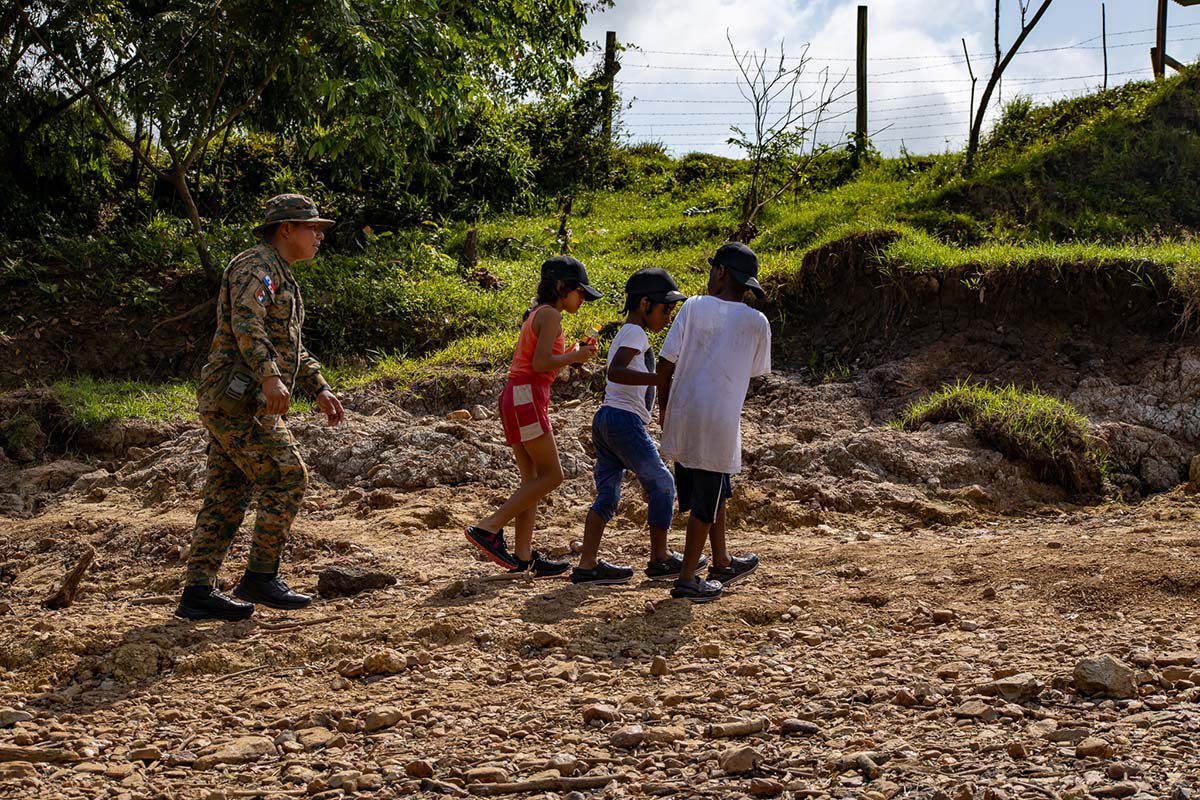Mental health
The migrant population in the Darien must cope with a high degree of stress and anxiety, as well as trauma caused by the risks and challenges of travel. These effects should be analyzed differentially by sex and age, since it is essential to have differentiated strategies for different groups within the population (Figure 12). Community interventions and joint work by the countries of the Americas through which migrants and refugees travel, and by humanitarian organizations, are essential to improve timely access to mental health care and psychosocial support.
Migrants face multiple hazards, including travel through difficult terrain, extreme weather conditions, the threat of wild animals, and the risk of violence, as well as uncertainty. All of these factors cause a high degree of stress and anxiety.
Many people are also exposed to traumatic events such as losing loved ones or becoming victims of violence, or being exploited or abused while traveling. These experiences can have lasting effects on their mental health. In addition, some people face separation from family and friends while traveling, or communication with them may be interrupted, which can lead to feelings of loneliness, depression, and emotional distress. In addition, some people encounter language and cultural barriers that make it difficult to seek health services in a timely manner.
It is important to emphasize the limited access to mental health services, given the lack of infrastructure and limited personnel and resources available to address these issues. Moreover, it is necessary to provide care spaces for those who respond to the emergency.
Services offered by cooperation organizations in Colombia
Individual psychosocial care
- HIAS, the Colombian Red Cross, the International Organization for Migration (IOM), and Mercy Corps with its implementing partner IPS Polo Salud.
- World Vision International's point of care and counseling service has a protective space where psychosocial support is provided to migrant children.
- Heartland Alliance International oversees self-care efforts in mental health.
- The Office of the United Nations High Commissioner for Refugees with its implementing partner, HIAS.
Specialized services
- Telemedicine services, through an agreement between the Psychiatric Hospital of Medellin-HOMO and the IOM.
- Mercy Corps.
- Colombian Red Cross.
- IOM.
- HIAS.
Services offered by cooperation organizations in Panama
Ministry of Health
The Ministry of Health does not provide mental health care to the migrant population in transit, as it does not have the necessary human resources to do so: it has only one psychologist and one social worker. In the entire region there are no physicians specializing in psychiatry.
International Organization for Migration
According to IOM's monthly operational reports, one of the areas of work concerning the migrant population in Panama is migration and health. Actions provided by the IOM focus on the following topics:
- Training in psychosocial issues for migrants in transit and members of host communities.
- Psychosocial assistance to migrants residing in the country and host communities, from January to April 2024, through the services of a psychologist.
- Training for governmental partners, civil society, and the private sector, in a comprehensive approach to gender-based violence.
HIAS
HIAS has a presence in the two migrant receiving stations of San Vicente and Lajas Blancas, as well as in the community of Bajo Chiquito. Previously they offered their services in the community of Canaán Membrillo, but due to changes in migratory flows they have given priority to operating in other communities.
The mental health programs developed in the field focus on support networks and community spaces, as well as on nonspecialized targeted care. To this end, a team of people is distributed among the sites where care is provided. The team is made up of two psychologists who are in charge of individualized care, and two health promoters with a community background, who are in charge of psychoeducational group actions.
Mental health cases requiring specialized care are usually referred to other organizations such as Doctors Without Borders. These cases involve diagnosing schizophrenia, anxiety, depression, and bipolar disorder. They also currently have a cross-border protocol for the care and follow-up of migrants in transit with mental disorders, involving HIAS personnel from Colombia, Costa Rica, Honduras, and Panama. The use of internal records allows for follow-up, and for pharmacological and psychosocial management of these cases.
Pan American Development Foundation and the Panamanian Red Cross
These two organizations provide mental health support to both adult and child migrants.
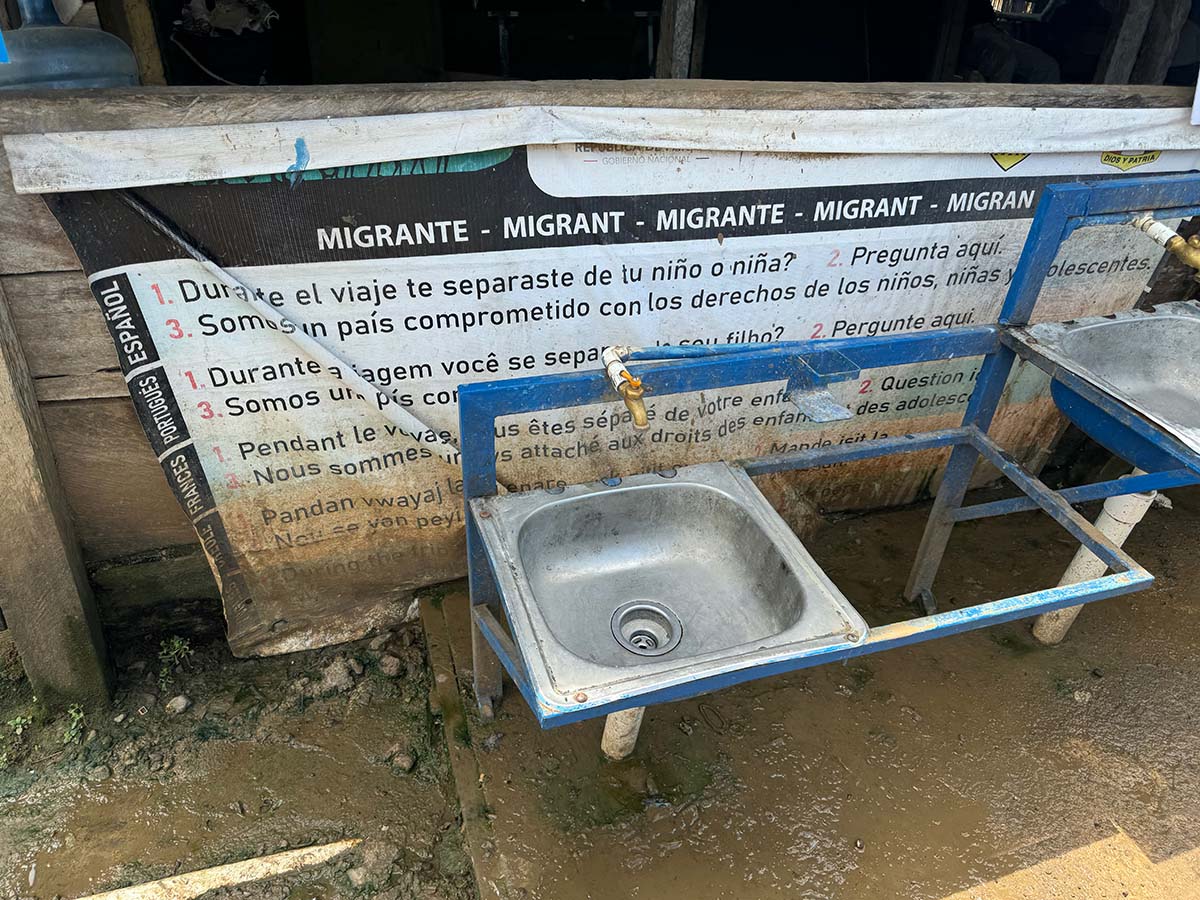
Needs, gaps, and failures in mental health response
This study has identified several significant gaps and needs that affect the mental health of the migrant and refugee population in transit. These findings are the result of constructive and collaborative dialogues with the cooperation partners of the Colombia-Panama cross-border round table, the health authorities in each country, and local case management and assistance provided by PAHO in the territory. This process offered a detailed and contextualized view of the challenges faced by the migrant population, in terms of access to adequate and timely mental health services and psychosocial support:
- There is insufficient time to follow up with patients and provide continuity of treatment; only one opportunity for care can be offered.
- Following up with patients is difficult because they often change their telephone numbers and stay in one place for only a short time.
- There are no support networks or clinical histories to facilitate patient follow-up and monitoring.
- There are no specialized services for children's mental health.
- There is a lack of specialized human talent to provide services to both the migrant population in transit and the host population.
- The cost of psychiatric evaluation is very high. Patients drop out before they are provided with an answer, due to the red tape involved and other barriers to access.
- Inadequate care facilities.
- Lack of psychiatrists for face-to-face care. Telemedicine works provided that a health professional accompanies the patient in person.
- There is a lack of resources for care and for the delivery of medicines, taking into account the continuity of the agreements with the cooperation organizations.
- Caregivers lack spaces for humanizing the delivery of health care services.
- Doctors providing health services in Darien lack decent housing conditions, access to safe drinking water, and electricity. These conditions affect the provision of services and contribute to the physical and emotional exhaustion of human talent.
Sexual and reproductive health
Access to sexual and reproductive health services is essential for migrants and refugees in transit. To provide this care, it is necessary to consider the various problems involved in order to provide an adequate and comprehensive response that addresses the dynamics of mobility, the risk factors associated with the situation, and the availability of services.
The main sexual and reproductive health needs of the migrant population in transit include access to contraceptives, and prevention and treatment of sexually transmitted infections. The migrant population is at increased risk due to overcrowded conditions and the lack of information and resources to prevent these conditions, as well as the multiple forms of violence they face along the way. It is also important to support host communities, given the risk they face as the result of preexisting vulnerabilities, and the need for prenatal and postnatal care, and for comprehensive care in cases of sexual and gender-based violence.
Meeting these needs is essential to protecting and improving the health and well-being of the migrant population in transit. Figure 13 shows the main events related to sexual and reproductive health in the migrant population.
Of the 1861 migrants who accessed the Colombian health system, 6.9% (129 women) sought care for an event related to sexual and reproductive health. The most frequent consultations were for gestational monitoring during the different trimesters of pregnancy (18 to 28 years being the most common age), followed by contraceptive counseling. In the case of men, there were two cases of sexually transmitted infections (HIV and syphilis).
In January and February 2024, six miscarriages requiring emergency admission were recorded at the San Sebastián de Urabá Hospital in the municipality of Necoclí, Colombia. There was also a request for a voluntary interruption of pregnancy, in which it was necessary to review with the Ministry of Health the reasons for the lack of care at the State Social Agencies (ESE) and refer the patient to the municipality of Apartadó.
Sexual and reproductive health care services offered in Colombia
Care for pregnant women
- Colombian Red Cross.
- Mercy Corps, through IPS Polo Salud.
- IOM.
- Medical Teams, through ESE Hospital San Sebastián de Urabá.
- Action Against Hunger.
- Doctors of the World.
HIV, hepatitis B, and syphilis screening and testing
- Aid for AIDS.
- Colombian Red Cross.
- Mercy Corps, through IPS Polo Salud.
- IOM.
- Medical Teams, through ESE Hospital Francisco.
- Anchor Foundation.
Family planning counseling, insertion and removal of subdermal implants, placement of intrauterine devices, workshops and lectures on sexual and reproductive health, sexual and reproductive rights, menstrual health, the right to eroticism and pleasure, and risk prevention in the use of social networks.
- Mercy Corps, through IPS Polo Salud.
- IOM.
- Aids For Aids.
Sexual and reproductive health care services offered in Panama
United Nations Population Fund
Provides essential supplies and services in the province of Darien for obstetric and neonatal care. Also offers counseling sessions on contraception and other health issues.
Ministry of Health of the Republic of Panama
Provides care to pregnant women and addresses sexual violence with a clinical approach.
Needs, gaps, and failures in responding to sexual and reproductive health needs
- The migrant population has little perception of the risk of contracting sexually transmitted infections.
- More rapid screening tests for sexually transmitted infections, verification of test quality, and technical support for professionals are needed. Availability of medical advice and support is scarce, given migrants’ short length of stay.
- Long-term family planning methods require specific care, and migrants reject this, since they think it would make them unable to continue their journey, which is their main objective.
- This makes it harder to access contraception and make informed decisions. The methods that women, girls, and adolescents have access to do not meet their needs, and present various risks to their physical health, such as hemorrhage, migraine, or gynecological problems.
- Some women travel to Colombia in order to gain access to permanent contraception methods. However, they sometimes encounter obstacles to obtaining medical services, either due to the lack of availability of the procedure or administrative red tape.
- Promotion of condom use and dual protection is greatly lacking.
- Obstacles to exercising the right to voluntarily terminate pregnancy have been identified; this includes the requirement that a woman wishing to have an abortion must assume the cost of the medication; in addition, there is a lack of trained medical personnel to perform the procedure. This situation has created risks for pregnant women, who have sometimes been urged to move to other municipalities to receive care, thus increasing their vulnerability, since migrants and refugees have scant economic resources. In contrast, there have also been cases in which medical personnel have pressured migrant women to voluntarily terminate their pregnancy, thereby violating their right to make free reproductive decisions without coercion, discrimination, or violence.
- Given the conditions when in transit, it is impossible to continue receiving prenatal check-ups; information needs to be provided on risk factors and where to go in the event of an emergency during the journey.
- Migrant pregnant women in transit have reported difficulties accessing prenatal care services that would allow them to monitor their health during pregnancy. In some cases, women suffer discrimination and difficulties in accessing ultrasound scans in hospitals, forcing them to turn to humanitarian organizations for the necessary care.
- Dissemination of the Protocol for the Comprehensive Health Care of Victims of Sexual Violence (Resolution no. 459 of 2012) and of the Pathway to Care in Cases of Gender-Based Violence, including sexual violence, is highly imperfect, given that this information is not present in hospitals or points of care where it can be seen by survivors of sexual violence; this increases stigma, taboos, and obstacles to accessing medical and psychological services in such cases. Similarly, the pathways to care in situations of gender-based violence are neither clear nor visible to the migrant and refugee population, a situation that exposes them to increased risks.
- There are gaps in providing care with a gender perspective and survivor-centered approach, with evidence of frequent comments and actions that re-victimize people and limit access to care.
- Sexually transmitted infections have been reported in girls under 14 years of age in the host population where migrants are in transit. It is necessary, therefore, to help communities and institutions to develop prevention and promotion efforts in communities with the largest flows of migrants.
Communicable diseases
Due to its geographic characteristics and the transit of migrants from Africa, Ecuador, Haiti, and the Bolivarian Republic of Venezuela, the subregion of Urabá (both Antioquia and Chocó) has seen increased circulation of vector-borne diseases. This is confirmed by reports of a significant number of cases of malaria and dengue, with no readily available supply of services to diagnose and treat these diseases.
As of 4 April 2024, 104 events of public health concern among the irregular migrant population had been reported to the National Health Surveillance System (Sivigila) in Colombia. The localities of Apartadó, Carepa, Montería, and Necoclí had the highest number of reports related to the migrant population (Table 1).
The municipality of Necoclí provides screening for malaria and dengue fever in the boarding area of one of its maritime transportation docks. The University of Wisconsin's One Health project performs screening there, using rapid tests; in case of a positive result, and with the patient's consent, a blood sample is obtained for a laboratory test (polymerase chain reaction – PCR).
The lack of access to health services, sanitation, basic hygiene, and safe drinking water, along with the consumption of street food and nights spent sleeping outside, have increased the occurrence of skin lesions, respiratory infections, and foodborne diseases in the under-5-year-old population – the main cause of death in this age group in both countries, especially in the host communities that migrants pass through.
In the province of Darien (Panama) there is a notable lack of mandatory reporting of public health events. According to reports by the authorities, this is due to the shortage of human resources and high patient demand. Currently, the service is being strengthened with human resources for health, and training is being coordinated to train personnel to report these events. The most commonly reported event in 2024 is sexual violence inflicted on women between the ages of 18 and 30 (Figure 14), which is of great concern to the Government.
Services offered by cooperation organizations in Colombia
- One Health performs rapid tests for malaria, dengue, COVID-19, and influenza.
Needs, gaps, and failures in the response to communicable diseases
- Difficulty in accessing health services exacerbates the vulnerability of both the migrant population in transit and the host population.
- One of the main challenges involves actively searching for and detecting communicable diseases among migrants in transit.
- The migrant population in transit has little perception of the risk of infection.
- Hygiene and sanitation are poor, and there is insufficient access to safe water, including drinking water.
- Vaccination coverage among transiting migrants is low, especially among Venezuelan migrants. This is compounded by the situation in Panama, which does not have vaccines available for this population.
- There is no graphic information on communicable diseases and self-care measures.
- Given the limited availability of resources, some people travel with footwear that is not their size, thus increasing various risks en route.
- Food sold on the street or in inappropriate establishments increases the risk of foodborne illness.
- There is nowhere to isolate people with communicable diseases.
- There is a lack of diagnostic and treatment facilities for malaria and dengue fever.
Noncommunicable diseases and chronic diseases
Chronic diseases represent a significant health burden for the migrant population in transit. This burden is exacerbated by difficult travel conditions and the lack of access to adequate medical care. This is due to the lack of necessary medical infrastructure in the Darien region, as well as the absence of specialists, supplies, and medicines to treat these ailments.
Other risks also significantly degrade the health of the migrant population: lack of ongoing access to medicines, timely diagnosis, and adequate food, as well as the physical exhaustion of travel. Interruptions in case management can worsen chronic diseases and increase the risk of serious complications and avoidable disabilities. Finally, the stress associated with migration and the difficult living conditions in the Darien region can exacerbate the symptoms of chronic diseases and negatively affect the mental health of the migrant population.
Of the 1861 individuals who sought care in Colombia, 5.4% (101 people) presented a condition related to a chronic disease (only the four leading causes are shown, Figure 15). The most common reason for consultation was hypertensive disease; women between 29 and 59 years of age were the group requesting the most services for chronic noncommunicable diseases.
Services offered by cooperation organizations
Health care and pharmacological treatment for hypertension
- IOM.
- Mercy Corps.
- Medical Teams.
- Colombian Red Cross.
- Medical Teams offers pharmacological treatment for diabetes
Diagnosis of HIV
- AID for AIDS.
- Anchor Foundation.
- Mercy Corps.
Pharmacological treatment for HIV
- AID for AIDS.
Needs, gaps, and failures in caring for chronic diseases
- Migrants in transit who have diabetes or hypertension, or who need medications to treat psychiatric disorders, retroviral drugs, etc., lack access to medicines to control their conditions, especially high-cost medicines.
- Migrants stay for too short a time to be provided appropriate diagnosis and timely counseling.
- There are deficiencies in the procedures to control chronic diseases such as hypertension and diabetes; this is attributable to the lack of resources for performing rapid laboratory tests to verify the status of patients and their disease.
- Only a minimum period of continuous treatment can be guaranteed, since there is a limited ability to provide extensive treatment.
- Difficulties include accessing insulin (cold chain issues) and patients’ housing conditions.
- In Colombia, since the migrant population is in transit and does not have health insurance, the care pathway cannot be activated; patients continue their journey without medicines and sometimes without information about their health condition.
- There is a lack of emergency services for dental care (no exodontia services for non-members).
Children and health: analysis of migration and host communities
Migration in the Darien region has a significant impact on the health of children, who face considerable physical, emotional, and social risks. It is crucial to put in place effective measures to protect and ensure the well-being of this vulnerable population; this includes access to adequate health services, psychosocial support, and protection from exploitation and abuse.
Migrant children are exposed to extreme conditions during the journey through the Darien region. This includes travel through rugged terrain, exposure to adverse weather conditions, and lack of access to food and clean water, all of which increases the risk of malnutrition, dehydration, and injury. In addition, the lack of proper hygiene and the poor sanitary conditions in makeshift camps along the route can increase exposure to infectious diseases such as dengue fever, malaria, and other waterborne diseases, posing a serious health risk to children.
Moreover, forced migration and associated traumatic experiences, such as family separation, violence, and uncertainty, can have a significant impact on the mental and emotional health of migrant children, increasing the risk of disorders such as anxiety, depression, and post-traumatic stress disorder. Added to this is the transition to a new and unfamiliar environment, which can be a source of added stress for migrant children, especially in terms of adapting to new cultures, languages, and support systems.
Access to safe drinking water is limited in the region; four municipalities in the Urabá subregion (Arboletes, Carepa, Necoclí, and Turbo) declared a public emergency due to a severe water shortage caused by the El Niño phenomenon in January 2024. By the last week of February, several children had been treated for diarrheal disease, skin rashes, respiratory infections, and underweight.
Services offered by cooperation organizations
Nutritional care
- Action Against Hunger provides itinerant services in the municipalities of Acandí, Necoclí, and Turbo.
- The Colombian Red Cross offered nutrition and dietetic services during January and February.
- The Colombian Family Welfare Institute distributed liquid Bienestarina.
- MedGlobal and Cadena distributed instant soup packets and energy bars.
Pediatrics
- IOM.
- Mercy Corps.
- Protección.
- Cadena gives out dolls for company, with self-care messages.
- UNICEF and World Vision are carrying out protection-related actions.
Needs, gaps, and failures in responding to nutritional health issues
- Comprehensive, complementary, and definitive health assessments of children under 5 years of age are needed.
- Complete vaccination schedules should be expanded for minors (many of whom do not have vaccination cards and do not remember which vaccinations they have received).
- When in transit, adults accompanied by children are focused primarily on continuing on the route, regardless of the children’s health; for this reason, in some cases coordination is needed between the health sector and the child/adolescent protection sector.
- Children should frequently be provided with nutritional care and supplements.
- Migrant children and adolescents in transit who sleep outdoors lack protection and are exposed to risks; psychoactive substances are frequently consumed in close proximity to them and in their presence.
